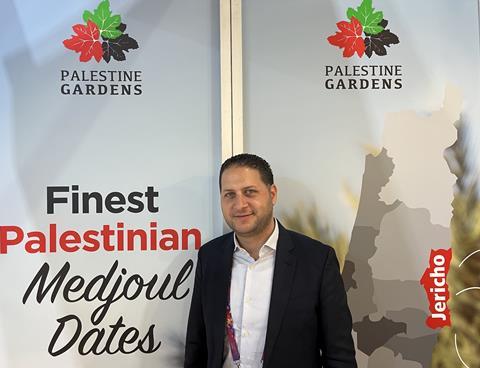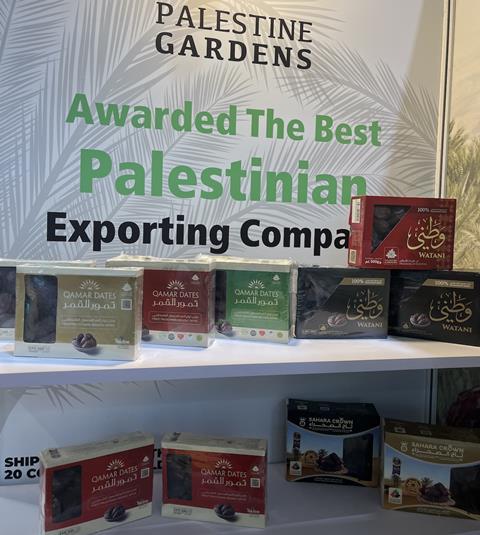Mo’men Sinokrot of Palestinian date specialist Palestine Gardens says the challenges to produce and export are severe, but the people’s commitment to the land remains steadfast

Nestled around the ancient city of Jericho, near the Jordan Valley, Medjoul date producer Palestine Gardens is quietly growing a global business, but according to managing director Mo’men Sinokrot, the challenges remain relentless.
From export logistics and access to water and inputs, to unfair competition, he says every stage of the supply chain is complicated by the economic and political reality of life under Israeli control. Yet Palestine Gardens still manages to export to more than 30 countries, in Europe (including the UK), North America, the Gulf and Asia.
“We work with around 50 growers across the Jordan Valley,” Sinokrot explains. “Most are small or medium-sized, though we also collaborate with some larger producers. Everything is processed and packed at our facility in Jericho, then exported by sea or, less often, by air.”
A complex journey
Palestinian goods bound for export usually transit via Israeli ports such as Ashdod or Haifa. But before a container can reach the port, it must clear multiple layers of security and logistical complexity.
“The container comes to our packhouse in Jericho,” Sinokrot says. “We load it onto a Palestinian truck, which is scanned and inspected at the Israeli checkpoint. Then it’s transferred to an Israeli truck and taken to the port. This process adds delays and costs.”
For markets further east, shipments can also go through Jordan’s Aqaba port via the King Hussein (Allenby) Bridge says Sinokrot. This route is typically used for exports to Asia and the Middle East.
Despite the hurdles, traceability remains a priority. “Every box is traceable from the field to the customer,” Sinokrot notes. “We’re GlobalGAP-certified and ensure that when a product is labelled ‘Palestinian’, it truly is.”
Resilience of dates
Water is a challenge across the Middle East, but date palms offer rare resilience. “The water we use has high salinity levels because we are in an area close to the Dead Sea, where the soil and water are salty, so it’s not suitable for vegetables,” Sinokrot explains. “But date palms thrive. That’s why the region has shifted from citrus and bananas to dates.”

Still, access to water is under threat. “In some areas, we used to get water from natural springs coming from Ramallah,” says Sinokrot. “But many of those are now tapped by Israeli settlers, who build wells upstream. What we get downstream has dropped to just 3 per cent of what we were getting ten years ago. To dig a new well, we need a licence from Israel, and they haven’t issued one since 1994.”
The challenges continue with inputs. “We can’t import certain fertilisers because they’re deemed dual-use items –potentially dangerous,” says Sinokrot. “But Israeli farmers can use them freely. That’s why their yields can be 40-50 per cent higher than ours. We can’t pass the extra cost to the customer. So our margins shrink. But we keep going – because this is our livelihood, and our land.”
Palestine Gardens offers three main brands: Comrade Dates for premium dates, Sahara Crown (mid-range), and Watani (more affordable), each tailored to different markets. “The taste and food safety standards are the same across all of them,” explains Sinokrot. “The difference is mainly in size and appearance. Our Medjoul dates are sun-dried naturally, so they’re fresh but, when stored properly, can last up to two years. That helps us manage delays.”



